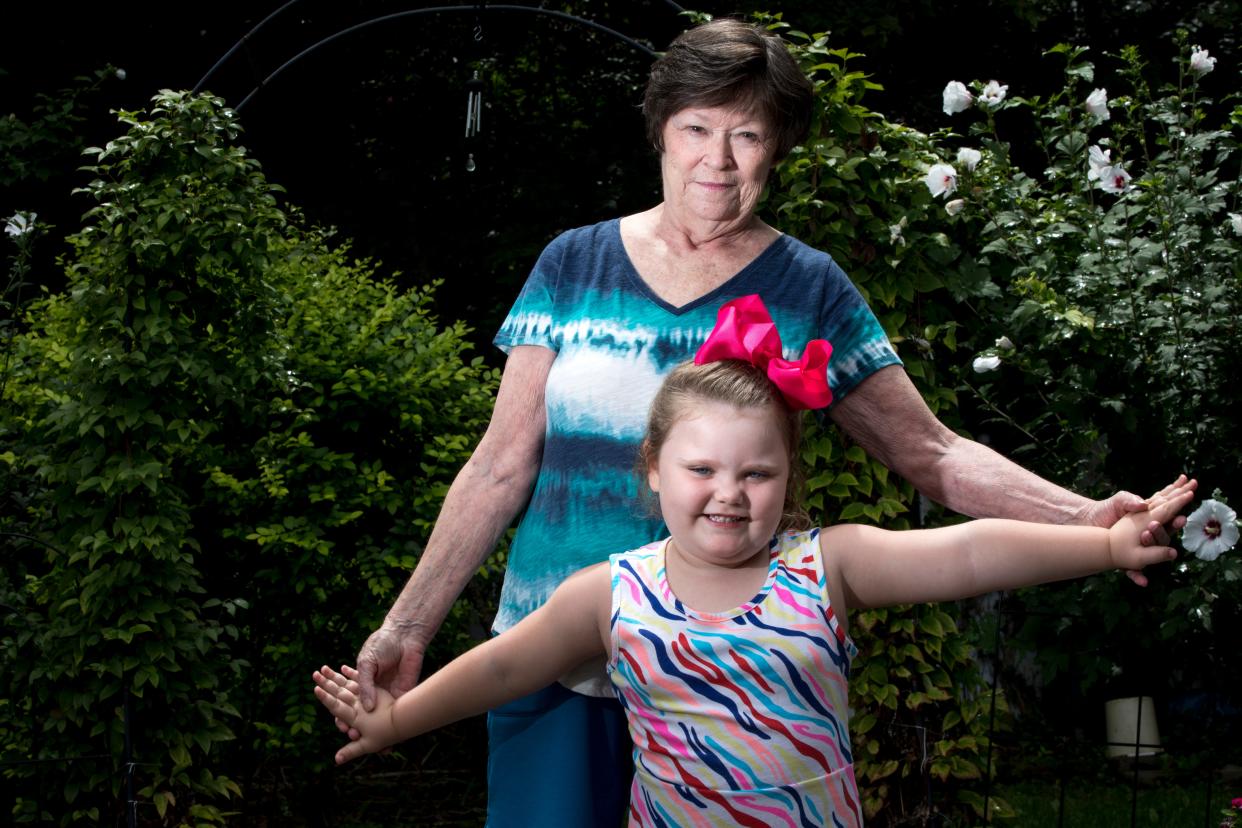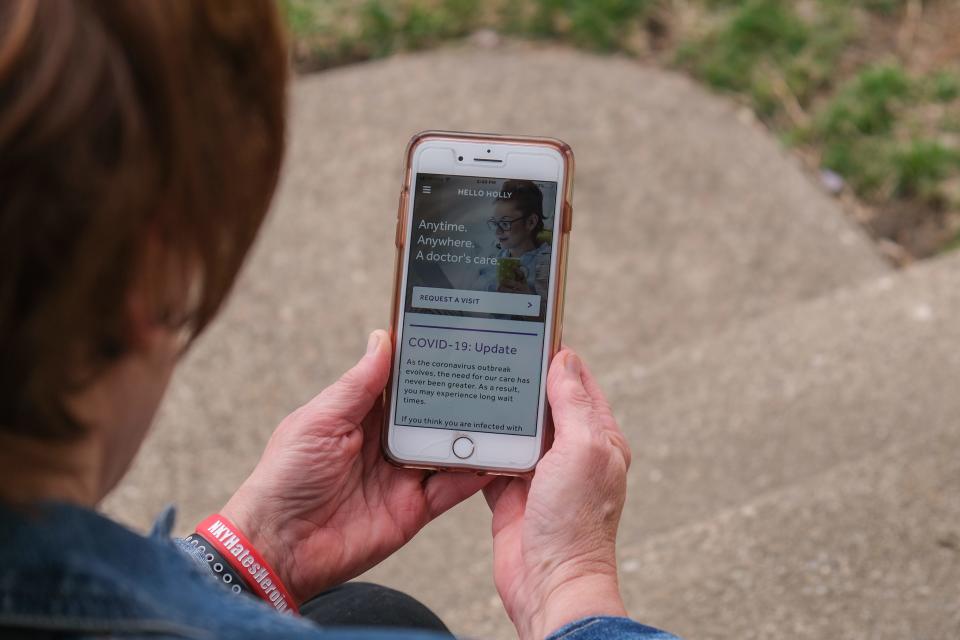Her great-granddaughter is going back to school. Will in-person classes pose a COVID-19 risk for her?

CINCINNATI, Ohio – Lyric was in her daisy-print, summer pajamaswhen she got up and burst into song.
“I believe I can fly,” she sang, prompting a smile from her “Mamaw.”
Mary Mahan of Taylor Mill almost wouldn’t be surprised if Lyric could. The busy, chatty 4-year-old, “does not walk," Mahan said. "She mostly runs.”
Mahan, 71, is Lyric's great-grandmother and has raised the child since birth. Lyric’s mom has an addiction disorder, and the chronic, relapsing condition has prevented her from retaining full custody of her daughter.
Caring for a child can be hard for a grandparent on any given day, said Mahan. Add the threat of COVID-19 and a looming school year to the mix, and the challenge is downright distressing.
"If I got it, who was going to take care of her full time?” Mahan asked, knowing there is no easy answer.
The risk of getting severely ill with COVID-19 or dying from it is greater for people 65 or older, U.S. Centers for Disease Control and Prevention data show. And in Kentucky and Ohio, a lot of seniors are raising their grandchildren.
The opioid epidemic, prompting more removal of children from parents with addiction, has left many children under grandparents' care. The family dynamic isn't new, though. The epidemic simply has added to grandparents and grandchildren living in the same household. People of color are also more likely to live with school-age children, newly released Kaiser Family Foundation research shows, and Black and Latino people are disproportionately affected by COVID-19. So they may have an additional risk of getting COVID-19 once kids go back to school.
Mahan's situation is also doubly worrisome: She is at high-risk for getting a serious case of COVID-19 not only because she is 71, but also because she's had breast cancer twice. The latest diagnosis – for which she's been treated and is doing well – was just in March.

Mahan had hoped Lyric would be off to preschool in a few weeks. The little girl qualified for it, and her great-grandma said Lyric would benefit from having a teacher, school friends and new activities.
"She can count and says her ABC's when she wants to," Mahan said. But Lyric is a typical 4-year-old and has trouble focusing when her great-grandmother pulls out the thick preschool learning book and tries to teach her.
Mahan does not consider home-based schooling ideal for Lyric.
Even so, she has relented and arranged a school option that will allow Lyric to attend preschool from home, using a Google Chromebook provided by the school and a teacher reached online.
“I am concerned about her going and possibly getting COVID,” Mahan said. “Even if she’s asymptomatic, if she brings it home to me…” her voice fades.
“I hate that she’s not going to be able to ride the bus and interact with other children."
About 6% of Kentucky's school-age children lived with seniors in 2018, the Kaiser Family Foundation report shows. In Ohio, the share is 5%. Of course, there are many others who are younger than 65 figuring out their grandchildren's school plan for 2020-21.
Dr. O'dell Owens, president and CEO of the nonprofit Interact for Health, said urban schools are attended by a lot of children who have grandparent guardians and are facing difficult questions about what to do if the children get COVID-19.
"How do you quarantine that child? Where does grandma go?" Owens asked.
Dr. Chaitanya Mandapakala, a St. Elizabeth Healthcare pulmonologist and ICU physician, said grandparents he treats often take part in routine care of their grandchildren even if they're not raising the kids. "They may take them to school and pick them up," he said. They may watch the children when working parents have to go out of town.
There are always risks, said Mandapakala, who treats COVID-19 patients.
"Logistically and practically, it is not possible to be perfect," he said. "We have to do the best we can."

The two doctors offered these suggestions for grandparents who've decided to send their grandchildren to school:
Make a plan to have children and teenagers wash their hands as soon as they come home from school. For young children, Owens said, "Have them sing the Birthday Song twice" to ensure they've spent adequate time washing.
Have younger children change clothes and give them a bath soon after school rather than waiting until later in the evening.
Have teens take a shower after school. "Every day when I come home I take a shower," Mandapakala noted.
Learn about the disease. Know your risks and how it spreads (most commonly through droplets) and protect yourself accordingly.
Teach and follow basic hygiene.
Limit people coming into your home. If you have a family member babysitting, try to maintain that relationship rather than moving the child from one caregiver to another.
Make a plan with family members about what you'd do if you got sick; what would happen if the child got sick? Know as much as possible in advance.

Have a primary physician or get one ASAP. That way, if you or the child develop symptoms of COVID-19, you can access the doctor quickly (often through MyChart and telehealth).
Make sure your doctor knows as much about your family's limitations with proximity and care of the child and helps develop a plan for you to remain as safe as possible within those limitations.

If your grandchild seems sick, with a headache, belly pain, fever, coughing or other symptoms, keep her home. Call the pediatrician and follow their advice.
Remember: COVID-19 is new. "We are still learning about it," Mandapakala said. Be familiar with updates on the disease. Use your doctor, health department, studies from infectious diseases experts and institutes or the CDC as resources, he suggested.
Follow Terry DeMio on Twitter: @tdemio
This article originally appeared on Cincinnati Enquirer: COVID-19: Grandparents raising grandchildren back-to-school risks

